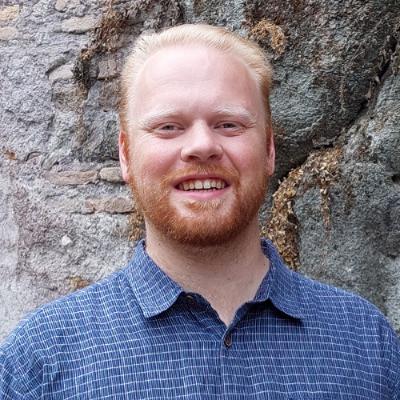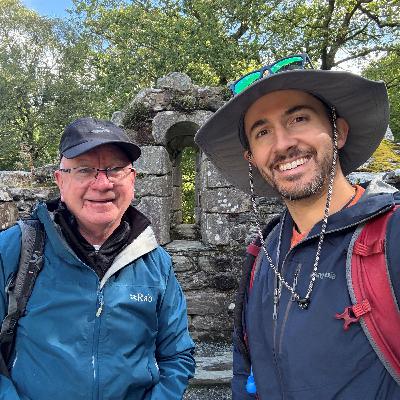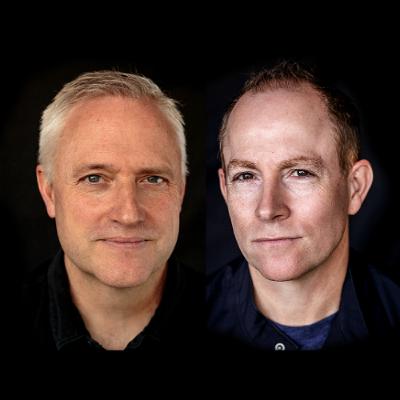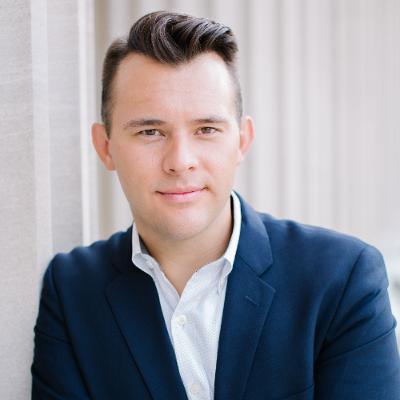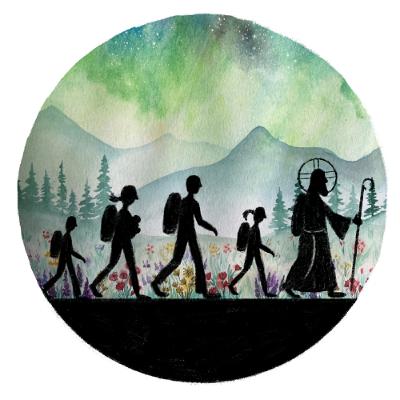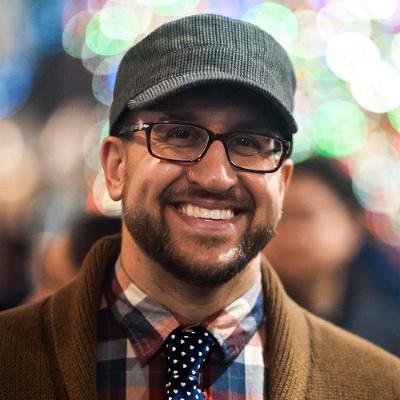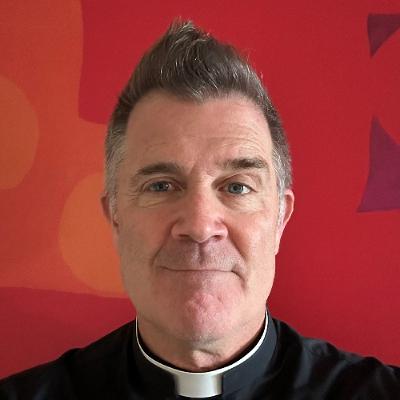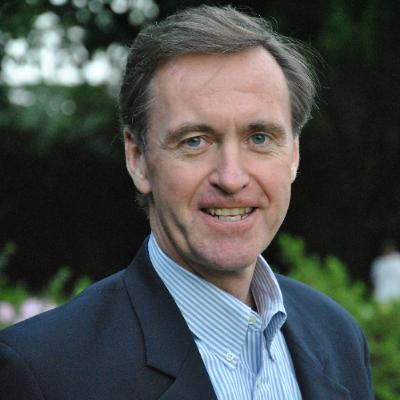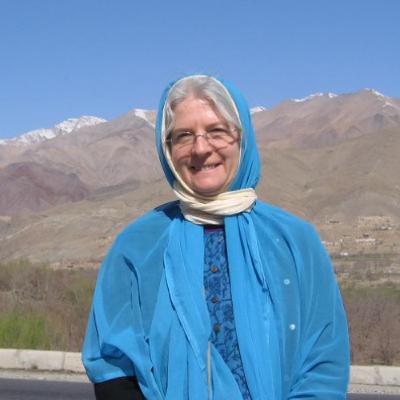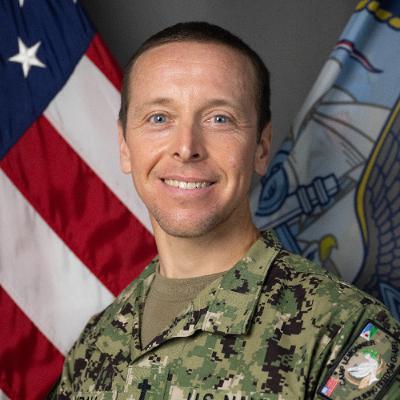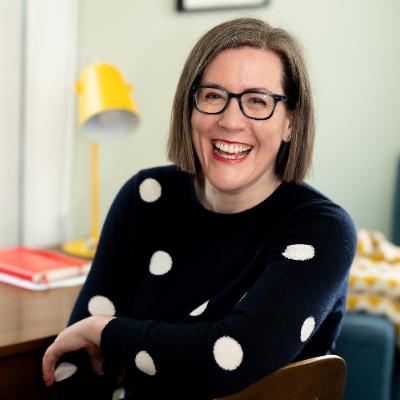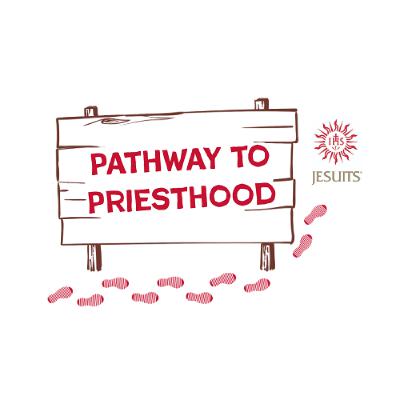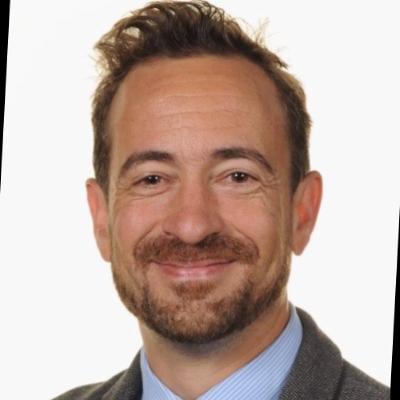Discover AMDG: A Jesuit Podcast
AMDG: A Jesuit Podcast

AMDG: A Jesuit Podcast
Author: Jesuit Conference
Subscribed: 204Played: 9,081Subscribe
Share
© All rights reserved
Description
Jesuits and friends come together to look at the world through Ignatian eyes, always striving to live Ad Maiorem Dei Gloriam -- For the Greater Glory of God. Hosted by Mike Jordan Laskey and Eric Clayton. Learn more at jesuits.org. A production of the Jesuit Conference of Canada and the United States.
383 Episodes
Reverse
Fr. George Drance, SJ, is a great example of the fact that Jesuits can do and be anything. Fr. George is a theatre artist, which, in his case, encompasses acting on the stage, directing, teaching acting classes at Fordham University in New York, and writing and adapting his own shows. He’s also the artistic director for the Magis Theatre Company, which he founded.
His work takes him all over the world: he has performed and directed in more than 25 countries on five continents. This past summer, Fr. George’s work took him to his ancestral homeland: Ukraine.
Ukraine, of course, has been facing wartime conditions since 2014, and the full-scale invasion of the country Russia launched in February 2022 has disrupted or destroyed countless lives. In that context, Fr. George visited a former Fordham student of his who is now living in the city of Kyiv and running an experimental theatre company there. Fr. George ran a workshop with Ukrainian actors and was involved in some performances in the city.
Host Mike Jordan Laskey asked him to talk about the experience of doing theatre in a war-torn land and why he thinks it’s so vital to keep making art in a world that’s on fire. It was a powerful conversation about his experiences in Ukraine and the inspiring artists he met there who are bringing beauty within a heartbreaking, enraging situation.
Magis Theatre Company: https://www.magistheatre.org/
Nashi Experimental Theatre Club in Kyiv, Ukraine: https://www.instagram.com/nashi.etc/?hl=en
Fr. George’s “Forming a Practice of Hope” series at the Jesuit Media Lab: https://jesuitmedialab.org/category/forming-a-practice-of-hope/
AMDG is a production of the Jesuit Media Lab, which is a project of the Jesuit Conference of Canada and the United States.
www.jesuits.org/
www.beajesuit.org/
twitter.com/jesuitnews
facebook.com/Jesuits
instagram.com/wearethejesuits
youtube.com/societyofjesus
www.jesuitmedialab.org/
On October 4 and 5, the Catholic Church will observe the 111th World Day of Migrants and Refugees. Today’s guest, who recently stopped by our studio in Washington, DC, is a perfect guest for the occasion. His name is Michael Petro, SJ, and he’s a Jesuit of the American East Coast province who is currently in the regency stage of his formation.
Michael’s regency has been quite far from the norm, though – he’s working in Beirut, Lebanon with Jesuit Refugee Service (JRS). Michael has worn a lot of hats in his time in the country, including setting up and running an emergency shelter for men, women and children who were displaced by the war between Israel and Hezbollah.
During a visit home to the U.S., Michael stopped by to share stories from his work in Beirut and to talk about his Jesuit vocation. It’s safe to say he never imagined he would be running a temporary emergency shelter in Lebanon when he joined the Jesuits in New York not long after he graduated college. Host Mike Jordan Laskey loved hearing from Michael about the people he has met and why it’s so important for the church to keep accompanying and serving migrants and refugees, even and especially when it’s not politically popular to do so. We think you’ll be moved by Michael’s stories and inspired by his faith in action.
Learn more about Michael:
https://jesuitspro.com/6373/
https://jrs.net/en/story/amid-bombs-in-lebanon-a-church-opens-its-doors-to-hundreds-of-migrants/
https://www.jesuits.global/2025/08/18/arrupe-migrant-center-in-beirut-to-gather-to-pray-to-play/
JRS in the Middle East and North Africa:
https://jrs.net/en/jrs_offices/jrs-middle-east/
AMDG is a production of the Jesuit Media Lab, which is a project of the Jesuit Conference of Canada and the United States.
www.jesuits.org/
www.beajesuit.org/
twitter.com/jesuitnews
facebook.com/Jesuits
instagram.com/wearethejesuits
youtube.com/societyofjesus
www.jesuitmedialab.org/
St. Kevin is a 6th century Irish saint, best known, perhaps, for the monastery he founded at Glendalough, tucked deep into County Wicklow. Beyond the monastic community, Kevin has been immortalized by Irish poet Seamus Heaney in a poem called “St. Kevin and the Blackbird.” It’s a poem that speaks of a legend, a peculiar moment of prayer and stillness.
Our own communications team member, Eric Clayton, knew very little about St. Kevin until a statue was erected on the campus of his alma mater to honor his late friend and spiritual mentor, the Jesuit priest Jim Bowler. The statue depicted Kevin and his blackbird, and Eric wondered why.
Today’s episode tracks Eric’s own pilgrimage from a Connecticut university library to a cave over an Irish lake. His guide is the pilgrimage expert, Irish Jesuit Fr. Brendan McManus. Brendan is an award-winning author who has penned multiple books on the life-changing pilgrimages he’s made, most notably along the Camino de Santiago.
Journey with Eric and Brendan as they set out into the spiritual heart of Ireland.
Resources:
Take a look at some of Eric's photos from the pilgrimage: https://www.jesuits.org/stories/now-discern-this-chasing-after-st-kevin/#anchor2
Read the poem, “St. Kevin and the Blackbird,” by Seamus Heaney: https://glendalough.wicklowheritage.org/new-contributions/st-kevin-and-the-blackbird-read-by-seamus-heaney
Get a copy of Fr. Brendan’s classic book, “Redemption Road:” https://store.loyolapress.com/redemption-road
The screenwriters Brian Gunn and Mark Gunn are cousins, and they grew up in the 1970s and ’80s in a big Catholic extended family in St. Louis. The Gunns are an incredibly creative clan that has produced all sorts of actors and writers and directors, including Brian’s brother James, who you might know as the director of the most recent “Superman” movie and the “Guardians of the Galaxy” franchise.
Brian and Mark are both Jesuit educated twice over, alumni of St. Louis University High School and the College of the Holy Cross in Worcester, Massachusetts. It was during college that they started performing sketch comedy together, and they both moved to Los Angeles in the ’90s to pursue Hollywood dreams. Since then, Brian and Mark have worked together on films and TV shows, including the family adventure movie “Journey 2: The Mysterious Island” starring Dwayne “The Rock” Johnson and a 2019 superhero horror film called “Brightburn” featuring Elizabeth Banks. Their first project that made it big was a movie and series called “2gether,” which debuted on MTV in 2000. It was a hilarious parody of the boy band era of Backstreet Boys and *NSYNC and it was influential on the development of AMDG host Mike Jordan Laskey’s sense of humor. The actors playing the boy band became an actual boy band themselves, opening for Britney Spears and hitting the Billboard charts with two different albums. If you are an elder millennial, all we have to say is, “I know my calculus,” and you’ll sing back: “You plus me equals us.”
Mike asked Brian and Mark about their family and their Jesuit education, how they work together as a writing team, and what it’s like to work in the film industry. Mark and Brian also shared some creative tips they’ve learned in more than a quarter century in the trade. Finally, Mike couldn’t let them go without reminiscing about “2gether” and marveling at the fact that 25 years after the movie’s debut, the most popular film in the world right now is another movie about a fictional boy band. Though this new one is composed of demons and they’re being hunted by a KPop girl group... Anyway, we think you’ll enjoy this sneak peek into the lives of Hollywood screenwriters.
www.jesuits.org/
www.beajesuit.org/
twitter.com/jesuitnews
facebook.com/Jesuits
instagram.com/wearethejesuits
youtube.com/societyofjesus
www.jesuitmedialab.org/
It’s hard to believe, but Pope Leo XIV just passed the four-month mark of his papacy. That’s more than a full season. After the incredible amount of press coverage here in North America reacting in shock to the election of a pope originally from Chicago, the media frenzy quieted quickly and starkly. It’s fair to say Pope Leo doesn’t have a big, splashy personality, and add to that all the wild political headlines in the months since his election, it’s not surprising that Pope Leo has receded from the spotlight a bit. That’s probably a good thing; celebrity culture and Catholic culture don’t go all that well together anyway. But Pope Leo has certainly been busy despite fading from the headlines, filling his days with meetings and setting about the work of governing the church.
At this point in his papacy, we thought it was worthwhile to check in on these four months, and today’s guest is among the most qualified people on the planet to talk about it. Christopher White is the associate director for strategic initiatives and senior fellow of the Initiative on Catholic Social Thought and Public Life at Georgetown University, and he’s also the author of the recent book “Pope Leo XIV: Inside the Conclave and the Dawn of a New Papacy,” published by Loyola Press. Before Chris started his job at Georgetown this past summer, he spent four years as the Vatican correspondent for the National Catholic Reporter. He lived in Rome and spent his days meeting with Vatican sources and attending big papal events. He visited more than 20 countries with Pope Francis as part of the press corps. He is one of most astute and thoughtful church observers and commentators.
Host Mike Jordan Laskey asked Chris about these first months of Leo’s papacy and what we might want to be looking out for in the months ahead. We also talked about life as a Vatican reporter and what it’s like to cover an institution that is also your own spiritual home. We think you’ll learn a lot from Chris about Pope Leo’s priorities and how the institutional Church operates.
"Pope Leo XIV: Inside the Conclave and the Dawn of a New Papacy": https://bookshop.org/p/books/pope-leo-xiv-inside-the-conclave-and-the-dawn-of-a-new-papacy-christopher-white/a5f501d1c6a575db?ean=9780829459470&next=t
Chris' page at the Georgetown Initiative on Catholic Social Thought and Public Life: https://catholicsocialthought.georgetown.edu/people/christopher-white
www.jesuits.org/
www.beajesuit.org/
twitter.com/jesuitnews
facebook.com/Jesuits
instagram.com/wearethejesuits
youtube.com/societyofjesus
www.jesuitmedialab.org/
As Catholics, we’re familiar with the seasons of the Church year. We know to mark the days of Advent and Lent. We know that Easter lasts fifty days and that Christmas, too, is more than just a 24-hour period of time. We know that we spend most of our time in days called ordinary — and of course, we’re reminded of all of these seasons by the colors the priests wears at Mass.
But here’s a season you may have missed — it’s a green season, yes. But I wouldn’t call it ordinary. And right now, we’re celebrating — we’re in it! I’m talking about the Season of Creation. I know — it’s not a liturgical season. But as of 2019, Pope Francis has invited us to mark this important moment of the year as a time to recall our Gospel mission to care for creation. The season begins on September 1 with the World Day of Prayer for the Care of Creation and runs through October 4, which is the Feast of St. Francis of Assisi, the patron saint of ecology.
What’s more, the Season of Creation isn’t just a Catholic thing. In fact, the Orthodox Church as been commemorating this season in some way since 1989. And so, the Season of Creation is a time not just to seek God out in the created world, but to do so in the company of others — people of other denominations, other faiths. We care for our common home, and we necessarily do so together.
Today’s guests are here to talk to us about this important season — and to invite us to participate in a Pilgrimages of Hope to mark both this particular moment on the calendar and this Jubilee Year.
Dan Misleh is the founder of the Catholic Climate Covenant and has been working at this intersection of ecology and the Catholic church for decades. Prior to beginning the Covenant, he worked at the Department of Justice, Peace and Human Development at the United States Conference of Catholic Bishops.
Annie Fox is the provincial assistant for social ministry organizing in the Jesuits US West Province. She has more than thirteen years of grassroots organizing experience, and is passionate about interfaith relationship building. You’ll hear Annie speak quite powerfully about the importance of these pilgrimages, and so as you listen, if you find yourself moved to organize one of your own, I hope you’ll check out the links below. We have a lot of good stuff to resource you and your communities during this Season of Creation.
Pilgrims of Hope for Creation: https://catholicpilgrimsofhope.org/
Catholic Climate Covenant: https://catholicclimatecovenant.org/
Video on Youth Pilgrims: https://www.youtube.com/watch?v=ucyABWXcYEQ
Register for high school workshops: https://docs.google.com/document/d/1kVzdNfLoPggBfuttCulaP8q6SA0uQbo_DcwoB2g9Cog/edit?tab=t.0
Register for college and university workshops: https://us02web.zoom.us/meeting/register/7aGaPyAgQSOP0O0y52xRSg#/registration
More about the Season of Creation: https://seasonofcreation.org/about/
What does it mean to flourish? What does it mean for you to flourish? Have you ever really thought about it?
Too often, we’re forced to focus on mere survival. We limit our gaze to that which will get us through this moment and into the next. Too often, we obsess on all the things we’ve done wrong; we’re haunted by mistakes, fearful we’ll repeat past errors. Too often, we embody a disposition of scarcity, assuming there’s not really enough to go around and anything we’ve got must be protected at all costs.
What does it mean to flourish? None of that, that’s for sure. But do we dare dream about abundance? Do we even remember that Jesus told us that he came so that we may have life and have it abundantly?
God desires that we flourish. That’s why God created a good world. And that’s why today’s guest, Dr. Paul Schutz, has written a new book from Orbis Press called “A Theology of Flourishing: The Fullness of Life for All Creation.”
Paul is an associate professor of religious studies at Santa Clara University. He received his B.A. in English from Boston College and his M.A. and Ph.D. in Systematic Theology from Fordham University. His research focuses on the meaning and significance of creation in the Christian tradition, with an emphasis on how scientific research might inform religious accounts of humanity's relationship with other-than-human creatures.
As you’ll hear, his book is a great resource to anyone looking to reimagine and reorient our relationship to creation.
About Paul: https://www.scu.edu/cas/religious-studies/faculty--staff/paul-schutz/
Get his book: https://orbisbooks.com/collections/new-titles-spring-2026/products/creaturely-flourishing-a-new-theology-of-creation?variant=49699836920109
The Jesuit Media Lab was founded to help people navigate the intersection of creativity and spirituality. We know there are so many people out there who are creative—who want to make art and write poems and sing new songs—and who also draw their creativity from their faith lives, their own spiritual journeys. We know, too—from our own lived experience as well as from conversations with people all over the world—that Ignatian spirituality fosters the creative spirit alive within us. These things naturally go together. And so the Jesuit Media Lab exists to gather, form and unleash these folks back into the world to share the beauty that God has put within them.
One of those people happens to live right down the road from my house. His name is Brody Bond—a great guy. I’ve known him for a number of years now and whenever we’re together, our conversation is just so rich. Brody is a deep guy, very thoughtful, forever learning and seeking and trying to give new words to his own lived experience. And he’s a creative guy—both in his professional life, but also in his personal life. He’s a musician, a singer songwriter who has been hustling to share his music all over the country. It’s a vocation for him, to be sure, and one he’s been discovering in new and deepening ways these last few years.
In one of our conversations, I learned that Brody teaches classes in songwriting. He was telling me a little about his approach, how he asks people questions about their deepest desires, their understanding of life’s purpose. “Sounds more like a course in spirituality,” I said, “then a songwriting class.”
Brody’s response? These things are inseparable. I should’ve known; I’ve been to his shows. They’re spiritual experiences, opportunities to reflect in community while listening to some really good music.
So, I invited him to teach that course for the Jesuit Media Lab. And it was a big hit. But Brody is just such an engaging speaker, someone who just naturally gets this intersection of creativity and spirituality, that I wanted to get him back. I wanted to share with all of you a taste of the kinds of conversations he and I have about these topics.
If you’re someone who is interested in this intersection of creativity and spirituality, this conversation is for you. And so is the Jesuit Media Lab. So, stay tuned and listen up. And then head over to JesuitMediaLab.org to learn more.
And while you’re at it, check out Brody’s stuff. His website is https://brodybond.com/. And it’s entirely possible he’s playing a show near you.
Father Jack Bentz, SJ, is a Jesuit priest who works in campus ministry at Gonzaga University in Spokane, Washington. He also has a new podcast called “Catholics in Ordinary Time,” which is just an awesome title. The podcast was inspired in large part by his work during the Synod on Synodality at Blessed Sacrament Parish in Hollywood, where he served before moving to Spokane. The parish conducted a whole bunch of listening sessions, just as thousands of parishes around the country did, and Fr. Jack liked that approach. So his new podcast is centered on conversations with all different sorts of Catholics, with him serving as the interviewer and listener as his guests share their stories of faith. Host Mike Jordan Laskey really likes the idea behind his show, because while there are so many different Catholic podcasts out there hosted by members of the clergy, podcasting priests are usually in the position of explainer, apologist or teacher. There’s certainly a place for those types of shows, but in this flipped format, Fr. Jack models how a synodal church is a listening church.
Fr. Jack and Miked talked about the things Fr. Jack has learned about today’s young adults through his work at Gonzaga and at Blessed Sacrament, not to mention his decades of ministry in settings like theatre and other university campus ministry locations. Fr. Jack also shared a bit about his own vocation story, and how a kid growing up on a cattle ranch in rural Oregon came to be a Jesuit. You can find Catholics in Ordinary Time wherever you get podcasts.
Catholics in Ordinary Time podcast: https://www.iheart.com/podcast/269-catholics-in-ordinary-time-279045450/
Fr. Jack's Substack: https://substack.com/@jackbentzsj
www.jesuits.org/
www.beajesuit.org/
twitter.com/jesuitnews
facebook.com/Jesuits
instagram.com/wearethejesuits
youtube.com/societyofjesus
www.jesuitmedialab.org/
The Saturday after Pope Leo XIV was elected, he gave an address to cardinals in which he described his reasoning for selecting the name Leo.
He said there were different reasons for his choice, “but mainly because Pope Leo XIII in his historic Encyclical Rerum Novarum addressed the social question in the context of the first great industrial revolution,” Pope Leo XIV said. “In our own day, the Church offers to everyone the treasury of her social teaching in response to another industrial revolution and to developments in the field of artificial intelligence that pose new challenges for the defense of human dignity, justice and labor.”
The rapid rise of artificial intelligence, most potently visible through large language models like ChatGPT, was the driving force behind Pope Leo’s name choice. In the early days of his pontificate, he is suggesting that the Church has a key role to play in discussions about artificial intelligence – including its use, its regulation, and its effect on societies and individual human beings.
Our guest today is one of the world’s foremost experts on technology ethics and has served on a Vatican AI research group that is gathering scholars from multiple disciplines to engage issues around artificial intelligence. Brian Patrick Green is the director of technology ethics at the Markkula Center for Applied Ethics at Santa Clara University and teaches AI ethics and space ethics in Santa Clara University’s Graduate School of Engineering. With a background in both technology and Catholic moral theology, Brian is perfectly positioned to help the church think through the potential benefits and risks of AI and what our own spiritual and ethical traditions might have to offer the societal conversation at large. Host Mike Jordan Laskey asked him to talk about his work and how the Vatican is approaching the complex constellation of issues surrounding artificial intelligence. They also talked about how a Catholic might think about whether or not to use AI tools and how to use them. Mike loved how clearly and compellingly Brian talked about all this thorny stuff. As AI developments are changing every day, we feel like we’ll be calling Brian back before too long to hear his updated perspectives.
Brian Patrick Green: https://www.scu.edu/ethics/about-the-center/people/brian-green/
The Vatican AI research group’s book that Brian contributed to, “Encountering Artificial Intelligence”: https://www.amazon.com/Encountering-Artificial-Intelligence-Anthropological-Investigations/dp/B0CYK7C66L
AMDG is a production of the Jesuit Media Lab, which is a project of the Jesuit Conference of Canada and the United States.
www.jesuits.org/
www.beajesuit.org/
twitter.com/jesuitnews
facebook.com/Jesuits
instagram.com/wearethejesuits
youtube.com/societyofjesus
www.jesuitmedialab.org/
In honor of the Feast of St. Ignatius of Loyola on July 31, we're taking a green look at his Spiritual Exercises.
When today's host, Eric Clayton, was in college, he stumbled upon a book entitled “The Eucharist and Social Justice.” It’s a small volume and was easily tucked into his bag when he went to Nicaragua on a service immersion trip. He remembers paging through that book with an excitement that rarely appeared when reading other theology texts. But something about this one, this invitation to consider how the source and summit of our Catholic faith was in fact a radical call to justice — that was formative. It’s what he was looking for as an undergraduate who was very much searching for answers when it came to faith and God and the church.
The author of that little book is Sr. Margaret Scott. She’s a Handmaid of the Sacred Heart of Jesus and a renowned spiritual director and retreat giver. She’s fluent in numerous languages, which has led her into ministries that have taken her around the world. She has a lived experience of the universal church and the needs and joys of God’s people in many, many places. She has brought those insights into the classroom; she taught theology at Philly’s own Jesuit university, St. Joe’s.
But most importantly for today, she’s brought that same global perspective, that tender pastoral care, to a new book all about Ignatian spirituality and ecological conversion. It’s called “Ignatius Was Green: Ecological Dimensions of the Spiritual Exercises” and it’s available now from Paulist Press. Like “The Eucharist and Social Justice,” this is a small, approachable volume. And for those of us engaged in the ministry of the Exercises, it’s quite helpful. Sr. Margaret invites us to deepen our own encounter with Christ through the Exercises by paying careful attention to those places in Ignatius’ text that invite deeper ecological reflection.
Learn more about her book: https://www.paulistpress.com/Products/5716-7/ignatius-was-green.aspx
When Chris Lowney started his career as an investment banker at JP Morgan in 1983, his background leading up to that job marked an unusual path to the corporation. He had spent the past few years as a Jesuit in formation, after entering the Society of Jesus as a novice straight out of high school. Chris went on to work 18 years at JP Morgan, and during his tenure there, he started realizing that a lot of the stuff he had learned about Saint Ignatius and the history of the Jesuits during his Jesuit formation included a bunch of supremely relevant wisdom that corporate leaders in the “secular world” could learn from. So Chris started working on a book after retiring from the company, and in 2003 Loyola Press published “Heroic Leadership: Best Practices from a 450-Year-Old Company that Changed the World.” “Heroic Leadership” has become a modern classic in Jesuit spaces and pioneered the development what you could call Ignatian leadership studies.
Just this year, Chris is back with a supplement to his first book: “The Heroic Leadership Workbook,” which he wrote with an educational design expert named Judy Wearing. The workbook is a 30-day guide for leaders in any field to help them grow in qualities like self-awareness, ingenuity, love and heroism. The workbook’s exercises are great – they invite deep reflection and are so usable. Host Mike Jordan Laskey invited Chris on the show to talk about “Heroic Leadership” and why Chris thinks the Jesuit charism and history continue to be so helpful to 21st-century leaders both inside institutional church structures and far outside them.
Chris Lowney: https://chrislowney.com/
“Heroic Leadership” and the workbook: https://chrislowney.com/wp/books/heroic-leadership/
AMDG is a production of the Jesuit Media Lab, which is a project of the Jesuit Conference of Canada and the United States.
www.jesuits.org/
www.beajesuit.org/
twitter.com/jesuitnews
facebook.com/Jesuits
instagram.com/wearethejesuits
youtube.com/societyofjesus
www.jesuitmedialab.org/
Father Scott Santarosa, SJ, is the pastor of Our Lady of Guadalupe in San Diego, just a few miles from the U.S.-Mexico border. Founded in 1921 as the Mexican national parish of San Diego – meaning it could offer pastoral care to any Catholic in the city born in Mexico – the community has a long history of welcoming immigrants to the United States and their descendants. Under Fr. Scott’s leadership, the parish has entered a new era of standing in solidarity with immigrants near the border – from organizing pro-migrant processions to starting a migrant shelter than operated for about a year and a half to, most recently, accompanying individuals facing the threat of deportation to immigration court.
During the first of these visits to immigration court this past June, San Diego’s Bishop Michael Pham was one of the clergy members who attended, which led to national news coverage. (Bishop Pham, a refugee from Vietnam himself who grew up in San Diego, was the first U.S. bishop appointed by Pope Leo XIV. After the event, he suggested Fr. Scott might spearhead a new effort to keep the initiative going; plans are in the works for subsequent visits.)
On July 11, host Mike Jordan Laskey visited Fr. Scott at the Jesuit community house in San Diego for this conversation. They discussed the challenges parishioners are facing right now, and how the parish has responded to various immigration-related issues. Fr. Scott also shared a bit about why he feels called to this ministry, and why the Catholic Church must continue to support immigrants even when it’s politically unpopular or even dangerous. Because so much of the news coverage around immigration is impersonal and faceless, we think you’ll appreciate hearing Fr. Scott’s unique perspective from his vibrant and historic parish.
National Catholic Reporter article on Fr. Scott and other faith leaders accompanying migrants to immigration court: https://www.ncronline.org/news/san-diego-faith-leaders-say-their-presence-made-difference-deportation-hearings
Our Lady of Guadalupe Church: https://www.olgsd.org/
This past spring, host Mike Jordan Laskey traveled to New York for a Jesuit Media Lab theatre event. He was coordinating the outing with our JML contributor Renee Roden, who lives at a Catholic Worker house in Harrisburg, Pennsylvania. The Catholic Worker, of course, is the movement founded in 1933 by Dorothy Day and Peter Maurin, which grew from a newspaper dedicated to Catholic social teaching and pacifism to a network of houses of hospitality in urban areas and farm communes in rural areas.
Renee and Mike had some time before the event that evening, so they visited Maryhouse, a house of hospitality the movement opened in 1975 and where Dorothy Day spent the last five years of her life. It’s a pilgrimage site of American Catholicism. And unlike many other pilgrimage sites, Maryhouse isn’t a museum – it’s still a vibrant and active Catholic Worker house of hospitality to this day.
By a great stroke of luck, Dorothy Day’s granddaughter Martha Hennessy was in town and could give Renee and Mike a tour of the house. Martha was the seventh child born to David Hennessy and Tamar Day Hennessy, who was Dorothy’s only daughter. Martha spends most of the year on a farm in Vermont, but she frequently travels to New York to live and work at Maryhouse. Martha has carried on the Catholic Worker tradition in her own life, including participation in anti-nuclear protests with the Plowshares movement. As Martha showed Renee and Mike around Maryhouse, she spoke of her grandmother with such admiration and love, almost as if Dorothy herself were in the room. Mike invited Martha on the podcast to share stories from her life and reflections on how the Catholic Worker continues its work of mercy and justice today. We know you’ll love getting to know this incredibly special person who has carried on her family legacy with so much devotion and passion.
More about Martha: https://catholicworker.org/martha-hennessys-revolution-of-the-heart/
Martha’s connection with the Plowshares movement: https://kingsbayplowshares7.org/
The Catholic Worker Movement: https://catholicworker.org/
AMDG is a production of the Jesuit Media Lab, which is a project of the Jesuit Conference of Canada and the United States.
www.jesuits.org/
www.beajesuit.org/
twitter.com/jesuitnews
facebook.com/Jesuits
instagram.com/wearethejesuits
youtube.com/societyofjesus
www.jesuitmedialab.org/
From June 23 through June 27, 2025, on the campus of Loyola University New Orleans, student affairs professionals from across our network of Jesuit colleges and universities gathered to be formed and fueled by our shared Jesuit mission.
One of the keynotes from the conference featured four university presidents: Tania Tetlow of Fordham University, Vincent Rougeau of the College of the Holy Cross, Salvador Aceves of Regis University, and Xavier Cole of Loyola University New Orleans. The conversation was wide-ranging, hitting on a number of hot button issues facing the higher ed landscape today. Each of these presidents demonstrated through their thoughtful, passionate responses that they are committed not just to higher education but to leading Catholic, Jesuit institutions to meet the many needs of this moment. I left feeling inspired.
About an hour after that conversation ended, a second one began — with today's host, Eric Clayton. The four presidents kindly sat down in one of the beautiful studios on Loyola’s campus to continue the conversation they began on stage.
That’s what you’ll hear on today's episode.
Nestled in the Horn of Africa on the easternmost part of the African continent is a small country called Djibouti. It’s bordered by three other countries: Eritrea to the north, Ethiopia to the west, and Somalia to the south. Djibouti’s eastern border abuts the busy shipping lanes of the Red Sea and Gulf of Aden. These bodies of water are connected by the Bab al-Mandab Strait which serves as an essential gateway between the Mediterranean Sea with the Indian Ocean. Directly across that narrow body of water from Djibouti is Yemen.
You can imagine the geopolitical significance of this particular part of the world. You might be thinking of issues pertaining to global trade, to international peace, to development and humanitarian assistance. And you might not be surprised to know that there is a United States military presence in Djibouti.
But you might be surprised to learn that the only Catholic priest currently serving in the US military for the entire continent of Africa is living there in Djibouti. You might also be surprised to learn that this priest is a Jesuit, one who just a few months ago was teaching theology and neuroscience to undergraduates at Creighton University.
Now, Fr. Chris Krall is serving as a chaplain, having been called up from his reserve status at the end of the 2024 fall semester. Instead of grading papers, he’s traveling by helicopter to remote bases across Africa to bring the sacraments and a listening ear.
Fr. Chris is our guest today calling in all the way from east Africa. If you’ve ever wondered what it’s like to be a priest ministering to folks in the military, this conversation is for you. We talk about how Chris’ current mission fits into his Jesuit vocation of being available to go where God’s people need him. We wrestle with some of the possible tensions inherent in being a priest in the military. And we reflect on the surprising similarities between ministering to colleges students and ministering to women and men in uniform.
A note: This conversation was recorded in late May.
Host Mike Jordan Laskey is joined by Jesuit Media Lab fellow, Michael O'Connell, on this special episode of "AMDG: A Jesuit Podcast" to kickstart the summer.
Today we’re talking about joy. It can be a hard thing to hold onto in this moment: The headlines are scary; our lives are full of stress and worry; and, everywhere we turn there seems to be some new reason to be afraid.
But none of that is of God. And indeed, even in such moments, joy is waiting to be found.
It’s worth remembering that Jesus tells us he has come so that we might have life and have it more abundantly. That’s a joy-filled life he’s describing, not one that cowers in the shadows in fear and worry. Jesus wants us to step out and into the fullness of God’s creation.
Today’s guest is author Shemaiah Gonzalez. Shemaiah has degrees in English, intercultural ministry and creative nonfiction writing. And her new book, “Undaunted Joy: The Revolutionary Act of Cultivating Delight” gives us a roadmap back to a life full of joy.
Host Eric Clayton and Shemaiah discuss joy and delight and abundance and what it means to tell stories at the intersection of all three. We hope when the conversation concludes, you feel a bit more joyful—and perhaps inclined to pick up a copy of Shemaiah’s book.
Get her book here: https://www.amazon.com/Undaunted-Joy-Revolutionary-Cultivating-Delight/dp/031016317X
Visit her website here: https://www.shemaiahgonzalez.com/
Welcome to “Pathway to Priesthood”—a special podcast series from the Jesuit Conference of Canada and the United States.
In these conversations, we’ve been talking with Jesuits who are in the final days of preparing for ordination to the priesthood. We’ve reflected back on their vocation stories and experience of Jesuit formation, and we’ve wrestled with some of the biggest questions surrounding priestly ordination.
This is the final episode of the season—so we went big. We have two Jesuits today: Orlando Portalatin and Joe Lorenz.
Orlando is from Puerto Rico. Before joining the Society of Jesus, he had a 20 year career in human resources management. He says he doesn’t have a late vocation—he was just late to respond! Joe is from Maryland. He studied Arabic in college and as a Jesuit, taught English in Beirut for over 200 students.
As you listen to Orlando and Joe share their stories and reflections, I invite you to consider whether you or someone you know might be interested in discerning a call to Jesuit life. If so, head over to beajesuit.org. And I invite you to pray for all of the Jesuits who will be ordained this year as the begin their priestly ministry.
If you stop and think about it, it’s amazing that the work of William Shakespeare, more than 400 years old, is still read by pretty much every student in the English-speaking world starting in high school or before. Our guest today, Luke Taylor, SJ, has recently co-written and edited a volume that brings together two of his passions: the Bard’s work and Catholic education. The book is called “Exploring Catholic Faith in Shakespearean Drama: Towards a Philosophy of Education,” and Luke worked on the text with fellow authors David Torevell and Brandon Schneeberger.
Luke is a Jesuit scholastic from the UK who’s studying theology at Boston College. Before he entered the Society of Jesus, Luke earned a doctorate in comparative literature from Harvard and taught at the college level. Host Mike Jordan Laskey asked Luke about how the book came about and why he thinks Shakespeare’s work continues to be studied all these centuries later – and what particularly about the Bard’s work makes him perfect for a Catholic audience. They also talked a bit about Shakespeare’s disputed religious background and the likelihood he at least had some brief encounters with Jesuits. It was a fascinating conversation and we think you’ll love getting to know someone who has thought so much about the intersections between Shakespeare’s work, Ignatian spirituality and Catholic faith.
"Exploring Catholic Faith in Shakespearean Drama": https://www.routledge.com/Exploring-Catholic-Faith-in-Shakespearean-Drama-Towards-a-Philosophy-of-Education/Torevell-Schneeberger-Taylor/p/book/9781032741864?srsltid=AfmBOooEudxwsHTMxBt97rbMFZePoyvTFahb0t9LXLlQHBa64Kg7SL02
AMDG is a production of the Jesuit Media Lab, which is a project of the Jesuit Conference of Canada and the United States.
www.jesuits.org/
www.beajesuit.org/
twitter.com/jesuitnews
facebook.com/Jesuits
instagram.com/wearethejesuits
youtube.com/societyofjesus
www.jesuitmedialab.org/



